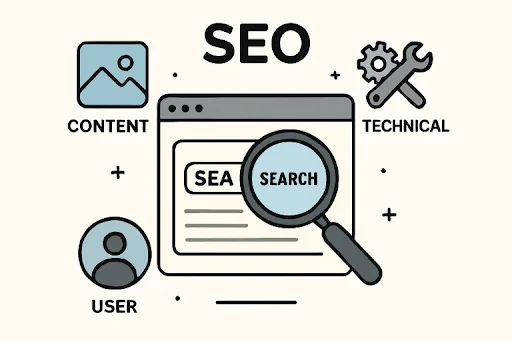Key Takeaways
- Search engines continue to update their algorithms, impacting website visibility and ranking.
- Quality content and user experience play a larger role than ever in SEO success.
- Staying current with SEO trends is essential for sustained online growth.
- Businesses should adapt their digital strategies based on evolving search behaviors and new data.
- Authoritative sources highlight the importance of search intent and technical SEO best practices.
Staying Ahead In Search: Adapting To a Shifting Landscape
The fast-moving and unpredictable nature of search engine algorithm updates has transformed the SEO field into an ongoing challenge. Every new update can impact a website’s organic visibility overnight, leaving organizations scrambling to adjust their digital tactics. To maintain and improve rankings, brands must move beyond superficial methods and invest in adaptable, meaningful strategies. Many forward-thinking companies, such as local businesses and enterprises alike, partner with an Austin SEO agency to leverage up-to-date expertise and ensure their approach remains ahead of emerging trends. These experts can guide businesses in understanding shifts in search behavior and implementing flexible strategies that respond to the evolving demands of users and algorithms for Search engine trends.
Research from established resources like Search Engine Land has shown that understanding and aligning with the intent behind search queries now plays a pivotal role in achieving strong organic rankings. Instead of chasing keyword volume alone, successful brands are focused on meeting users where they are—delivering content that matches their motivations, questions, and interests. This deeper connection leads to more extended site visits, higher engagement, and better search results.
User-Centric Content: The SEO Power Shift
Modern users expect far more than a simple answer; they want trustworthy, well-researched, and easily accessible information each time they click a search result. Google’s Helpful Content Update emphasizes providing genuine value to the human reader—moving away from content created purely to satisfy algorithms. Brands that recognize this shift, such as e-commerce stores developing comprehensive buying guides or service companies publishing clear how-to resources, often see increased organic traffic and improved audience trust. High-performing websites now invest in content that feels authentic, answers fundamental questions, and anticipates user needs.
This renewed focus on user-centricity also means companies must continuously evaluate the quality and accuracy of their published material. Outdated, thin, or irrelevant content can decrease credibility in the eyes of both human visitors and search engines. By making user experience central to content creation—formatting for mobile, adding helpful visuals, and updating information regularly—brands differentiate themselves in a saturated digital marketplace.
Unlock insights that matter most to your next big decision.
Technical SEO: No Longer Optional
Even with great content, technical fundamentals remain the bedrock of SEO. Factors like mobile responsiveness, fast load times, clean code structure, and secure browsing (HTTPS) are far from optional—they are prerequisites for ranking in today’s competitive environment. Meeting Google’s Core Web Vitals, a set of essential metrics that measure site speed, interactivity, and visual stability, can be the deciding factor for outperforming slower or outdated competitors. According to a recent analysis by Search Engine Journal, sites that align with these technical standards improve rankings and foster better user engagement and loyalty.

How Search Engine Trends Influence Your Digital Game Plan
Search engines grow more sophisticated, relying on artificial intelligence and contextual understanding to deliver results. Today’s users don’t just type keywords—they speak naturally into their phones, search with questions, and expect personalized results. This trend has significant implications for keyword strategies, pushing businesses to target more conversational and long-tail search terms that reflect how people communicate. Companies that update their content strategies to consider various user search patterns—including voice and mobile queries—see a distinct advantage in capturing new audiences and addressing the full range of user intent.
Harnessing Data to Refine SEO Efforts
Modern SEO is a data-driven process. With free and powerful tools like Google Analytics and Google Search Console, even lean marketing teams can track how users engage with their site, uncover behavioral trends, and identify content opportunities. Interpreting this data allows brands to make agile adjustments, whether that means expanding a blog section, revamping metadata, or responding to a sudden increase in demand for a particular topic of Search engine trends. A proactive, metrics-focused approach ensures that SEO tactics evolve alongside shifting trends and user preferences.
The Growing Value of E-A-T (Expertise, Authoritativeness, Trustworthiness)
As misinformation spreads online, search engines—and their users—are increasingly drawn to sites that prove their credibility. Google’s standards for E-A-T (Expertise, Authoritativeness, and Trustworthiness) are designed to promote reliable, well-sourced information, particularly in sensitive fields such as medicine, law, and finance. However, demonstrating E-A-T benefits every industry. Publishing detailed author bios, citing reputable sources, and regularly updating content all work to establish authority and trust—qualities search algorithms reward and users value for Search engine trends.
SEO Is Not Just About Google Anymore
While Google commands most of the search market, businesses can no longer ignore alternative search engines or platform-based search functions. Bing and DuckDuckGo appeal to privacy-minded users, while platforms like YouTube, Pinterest, Instagram, and TikTok have become powerful stand-alone search engines. Each demands a tailored optimization strategy: for YouTube, it’s engaging video titles and keyword-rich descriptions; for Pinterest, it’s clear, actionable pin copy and curated visuals. Diversifying your strategy to include these platforms can expand reach and tap into communities that traditional search may miss.
Continuous Learning Is Required for Sustainable Success
SEO is dynamic by nature. Marketers and business owners who approach SEO as an ongoing learning process—following trusted industry news, attending webinars, and continuously testing new techniques—stay ahead of the curve. Early adopters who embrace innovations such as AI-generated content, improved schema markup, or new content formats often gain early-mover advantages. Experimentation and ongoing education are key to building a resilient and future-ready SEO strategy or Search engine trends.
Conclusion: Growing With Search Engine Trends
Rather than seeing algorithm changes as hurdles, view them as opportunities for growth. Brands can achieve improved visibility and growth by focusing on user experience, maintaining technical excellence, and being agile in response to new search trends. Building trust with both search engines and audiences ensures that your digital presence remains strong—regardless of what lies ahead.
Journey beyond limits and uncover hidden opportunities now at The Glow ORM.

